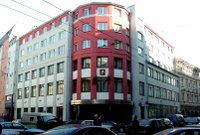 On December 4, elections were held for the Moscow Duma. They were seen as a rehearsal for the 2007 parliamentary and the 2008 presidential elections. As for the liberal opposition, these elections were envisaged as "a litmus test" for the prospects of a democratic breakthrough in Russia. Seeing the results, one may ask whether this was a litmus test turned sour for liberalisation prospects in Russia.
On December 4, elections were held for the Moscow Duma. They were seen as a rehearsal for the 2007 parliamentary and the 2008 presidential elections. As for the liberal opposition, these elections were envisaged as "a litmus test" for the prospects of a democratic breakthrough in Russia. Seeing the results, one may ask whether this was a litmus test turned sour for liberalisation prospects in Russia.What has become glaringly obvious during the election campaign is the control that incumbent mayor Yuri Luzhkov, by administrative and other means, has exercised to obtain the desired outcome by an overall victory of the "power party" United Russia.
United Russia's main opponent was, originally, the populist enfant terrible of Russian politics - the nationalist Rodina party. In the uprun to elections, Rodina played on racist sentiments among the Muscovites, namely popular fears of "strangers" - Caucasians, posing a threat to public safety. Such fears were confirmed by opinion polls, soon to be followed by Rodina TV-campaign-ads, portraying such strangers as "garbage". All moral judgement set aside, the administration used the campaign as a pretext for banning Rodina from the elections. In its place, the Communist party stepped in to fight for the "nationalist" populace.
Preliminary results of the Duma elections show that United Russia received some 47% of the votes, the Communists 17% and the liberal Yabloko party about 11%. By banning Rodina, the victory for United Russia was ensured with the foreseen side-effect that the more manageable Communists were strengthened. As for the liberal Yabloko party, the elections can only be characterised as a resounding failure in comparison to its high-pitched expectations. Why so?
A first reason is that Yabloko put so much hope on the elections as a turning-point for what they deem is Putin's failed policy of authoritarian modernisation. This, however, appeared to be beyond the point, as national politics were of little concern for Muscovites, who instead turned to local concerns.
Another reason is that liberals grossly exaggerated voter turnout. An estimated staggering turnout of some 60% in the end resulted in only 33% going to the ballot-boxes. This was, by all means, a fair turnout by Russian standards and an improvement compared to the 2001 local elections. Whatever made liberals think that things were to change this time, one can only speculate upon. All in all, it was yet another Yabloko misjudgement.
Finally, it is obvious that liberals underestimated the determination of people in power to use all means necessary to obtain desired results. As with anywhere in current Russia, free and fair elections are but a mirage, and one might have thought that Russian liberals by now had learnt this lesson. Instead, Yabloko's Sergei Mitrokhin was outraged by blatant breaches of electoral legislation, and steps were taken to contest the results. But, what's new? And besides, who should the liberals appeal to? There is no greater justice or public conscience of "fairness" in today's Russia, so what's the point of hollering "it's not fair"? What else to reply but: "-It's the politics, stupid!"
The Moscow elections are, by all means, a failure for the prospects of a liberal turnaround in Russia. For the liberals, it is once more clear that they have let the basics of Russian politics turn sour on them - litmus-test or no litmus-test. However, one might ask what alternative liberals in Russia are left with but struggling for a few seats in managed elections. Perhaps, it is becoming painstakingly clear, that change in Russia will not come about by balloting but by similar "revolutionary" events as we have seen in Georgia and Ukraine during recent years. The question is whether popular sentiments will ever reach the boiling-point as long as the current stability and relative economic progress is maintained. Would current developments turn negative and such revolutionary change come about, one may also ask what role Russian liberals might be able to play.
Last but not least, one must speculate on how long the Kremlin will allow Moscow mayor Yuri Luzhkov to retain his relative independence in Russian politics. When will we see an infight between Luzhkov and Putin's entourage? This may, indeed, be a much more interesting question than more or less staged elections to the Moscow Duma. Such conflicts in the ruling élite would pose a much greater danger to a peaceful and managed succession of power among the élite in the 2007 and 2008 elections. However, what is obvious, is that Russia's liberals today seem unable to exploit such differences, and instead put their hopes on factors beyond their control. As long as this is the case, all attempts at liberaling Russia will, most likely, turn sour.



No comments:
Post a Comment